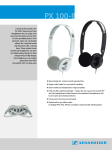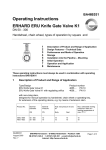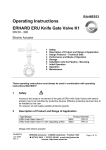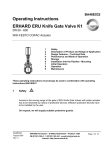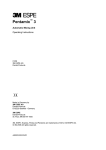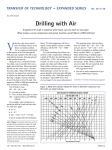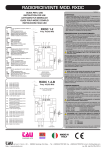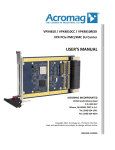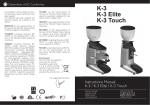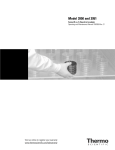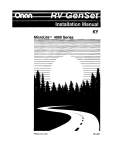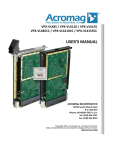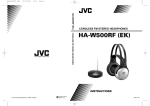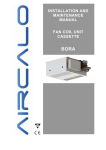Download Operating Instructions ERHARD ERU Knife Gate Valve K1
Transcript
BA46E042 Operating Instructions ERHARD ERU Knife Gate Valve K1 DN 350 - 600 Electric multi-turn actuator 1 2 3 4 5 6 7 Description of Product and Range of Application Design Features – Technical Data Performance and Mode of Operation Storage Installation into the Pipeline - Mounting Initial Operation Operation and Application These operating instructions must always be used in combination with operating instructions BA01E001! 1 Description of Product and Range of Application ERU Knife Gate Valve K1 with rising stem Designed for automatic operation by means of electric actuator Product No.: 4607 .... PN 4 4617 ... PN 6 4657 .... PN 10 Nom. size DN Nom.press. Hydr. test pressure in bars Max. admissible working PN for pressure in bars at a working Body Seat temperature of < 80°C Product No. 350 10 15 10 10 4655....; 4657.... 400 - 600 6 9 6 6 4615....; 4617.... 400 - 600 4 6 4 4 4605....; 4607.... BA46E042 Nov. 2002 Rev. 5 ERHARD-Armaturen x D-89502 Heidenheim x Postfach 1280 ++49(0)7321-320-0 ++49(0)7321-320-525 e-mail:[email protected] Internet: http://www.erhard.de Page 1 of 12 Operating Instructions for ERU Knife Gate Valve K1 with electric actuator 2 Design Features – Technical Data Drawing 3E 60796 ERU Knife Gate Valve K1 with electric actuator BA46E042 Nov. 2002 Rev. 5 ERHARD-Armaturen x D-89502 Heidenheim x Postfach 1280 ++49(0)7321-320-0 ++49(0)7321-320-525 e-mail:[email protected] Internet: http://www.erhard.de Page 2 of 12 Operating Instructions for ERU Knife Gate Valve K1 with electric actuator Parts list for drawing: 3E 60796 ERU Knife Gate Valve K1 with electric actuator In column "E/V" the parts are marked as follows: Spare parts or sets of spare parts, e.g. E1 = spare parts set No. 1 or Wearing parts or sets of wearing parts, e.g. V1 = wearing-part set No. 1 and in column 2j and 5j (for 2 years‘ or 5 years‘ operation) Part Description 1 2 3 4 5 6 7 8 9 10 11 12 Qty. Body component Sealing element, cpl. Taper pin Compressor Packing cord, square Profile rubber Gate Washer Hexagon screw Hexagon nut Hexagon screw Hexagon nut *) quantity 2 1 *) 2 4 2 1 *) *) *) *) *) 2 j 5 j E/V x V1 x x V1 V1 Part Description 13 14 15 16 17 18 19 20 21 22 23 Washer Yoke Bush Stem Bolt Locking washer Washer Cylindrical screw Electric actuator Washer Cylindrical screw Qty. 2 j *) 1 1 1 *) *) 4 4 1 4 4 5 j E/V x E1 is variable depending on the nominal diameter DN Dimensioned table for drawing: 3E 60796 DN L H1 D1 d Travel Turns/ Travel 350 400 500 600 BA46E042 Nov. 2002 Rev. 5 78 102 127 154 808 908 1118 1322 505 561 666 780 TR 36 x 6-LH TR 28 x 5-LH TR 30 x 6-LH TR 36 x 6-LH 350 400 500 600 58 80 83 100 Set torque Nm OPEN CLOSED 120 110 120 110 120 110 160 150 ERHARD-Armaturen x D-89502 Heidenheim x Postfach 1280 ++49(0)7321-320-0 ++49(0)7321-320-525 e-mail:[email protected] Internet: http://www.erhard.de Page 3 of 12 Operating Instructions for ERU Knife Gate Valve K1 with electric actuator Dimensioned table to drawing: DN 3E 60796 El. actuator EMG Closing / opening time in sec. D3 E4 E5 E6 E7 H3 DREHMO 25 1226 217 139 108 1426 300 192 243 346 129 205 1736 2040 313 375 240 288 D 120-A/F10 (max. 120 NM) 200 400 D 200-A/F14 250 (max. 200 NM) Electric Multi-turn act. AUMA D3 E1 E2 E3 32 40 1) 50 80 87 69 43 150 120 96 60 156 188 125 150 100 120 63 75 Closing / opening time in sec. at nos. of revolutions of the el.actuator of N= 2) 1) 32 63 90 16 45 22 1305 217 158 108 77 55 38 H2 350 SA 10.1 - A/10 400 (max. 120 NM) 200 282 256 247 1405 1715 SA14.1-A/F14 315 385 325 285 2075 (max. 250 NM) 500 600 2) 16 350 500 600 at nos. of revolutions of el.actuator of N= 300 218 150 107 76 53 313 375 227 273 156 188 111 133 80 95 55 67 preferred series 1) 2) for standard actuator for modulating actuator BA46E042 Nov. 2002 Rev. 5 ERHARD-Armaturen x D-89502 Heidenheim x Postfach 1280 ++49(0)7321-320-0 ++49(0)7321-320-525 e-mail:[email protected] Internet: http://www.erhard.de Page 4 of 12 Operating Instructions for ERU Knife Gate Valve K1 with electric actuator 3 Performance and Mode of Operation ERU Knife Gate Valves K1 are wafer-type single-door gate valves with short face-toface dimension. A special type of these valves, e.g. with regulating orifice, is also suitable for regulating purposes. The solid gate slides in a long gate guide between two body components. It seals on its periphery against a rubber-resilient, steelreinforced, enclosed U-shaped sealing element. Where the gate leaves the body, tightness to the outside is ensured by a resiliently prestressed profile seal which can be readjusted. For reducing wear and tear of the profile seal and the actuating elements the prestress can be reduced to the dimension required for the actual operating pressure. The Gate Valves were tested for tightness and resistance to DIN EN 12266 and DIN EN 1074 at the manufacturer's plant. They are designed for flow acting from any direction. 4 Storage Store ERU Knife Gate Valves K1 in their closed position. Rubber-coated components, as e.g. the sealing element between the body parts, have to be protected against direct solar radiation. Avoid the effects of radiant heat, e.g. from heaters. BA46E042 Nov. 2002 Rev. 5 ERHARD-Armaturen x D-89502 Heidenheim x Postfach 1280 ++49(0)7321-320-0 ++49(0)7321-320-525 e-mail:[email protected] Internet: http://www.erhard.de Page 5 of 12 Operating Instructions for ERU Knife Gate Valve K1 with electric actuator 5 Installation into the Pipeline - Mounting Remove all packing material from the valve. Prior to installation, check the pipeline for impurities and foreign bodies and clean it if necessary. + There must be free access all around the valve for operation and maintenance. In case of flow media containing solid matters as e.g. sand etc. and installation into horizontal pipelines the stem or the piston rod should not be installed with an inclination of more than 30º towards the horizontal. Thus, free flushing of the travel range of the gate is possible. In case of deviating installation positions, especially with suspended stem or piston rod, deposits around the gate have to be expected. This could lead to mal-functions which increase maintenance work. During installation of the valve, the distance between the pipe flanges should exceed the valve face-to-face dimension by at least 20 mm. Thus, the raised faces will not be damaged and the gaskets can be inserted. Steel-reinforced rubber seals to DIN 2690 are recommended for use as flange gaskets, for slip-on flanges they are absolutely necessary (consider resistance to flow medium and temperature). The mating pipe flanges must be plain-parallel and concentric. Tighten the connecting bolts evenly (without distortion) and crosswise. The pipeline mustn't by any means be pulled up to the valve. If the distance between the flanges is too large for the valve, use thicker gaskets to cover the difference. ERU Knife Gate Valves K1 are - clamped between two flanges of the pipeline (wafer type) or - screwed to the end flange of the pipeline as end-of-line valves. When installing the valve into the pipeline, the special flange drilling configuration has to be observed for this type of valve. One part of the screws connects the pipe flange with the body. The other part is placed along the body from pipe flange to pipe flange. BA46E042 Nov. 2002 Rev. 5 ERHARD-Armaturen x D-89502 Heidenheim x Postfach 1280 ++49(0)7321-320-0 ++49(0)7321-320-525 e-mail:[email protected] Internet: http://www.erhard.de Page 6 of 12 Operating Instructions for ERU Knife Gate Valve K1 with electric actuator 6 Initial Operation The electric actuator is concentrically mounted on the yoke of the ERU Knife Gate Valve K1. The stem of the knife gate valve is moved in vertical direction (OPENCLOSED) by means of the threaded bush of the electric actuator. The standard type of the electric actuator is equipped with: Torque and travel switches with 1 break and 1 make contact for each direction of rotation Blinker contact for indication of motor operation Heating in the switchgear compartment Thermal switch in the motor winding ERU Knife Gate Valves K1 are switched-off in a travel-dependent way in both limit positions. The switching points of the travel limit switches are set during the factory tightness test at pressure rating in such a way that the setting avoids the gate's clamping or running against the upper mechanical limit stop of the yoke due to motor after-running. The torque switches act as safety switches, e.g., in intermediate positions. If the valve is supplied without mounted electric actuator, the travel limit switches have to be set after mounting the electric actuator. See section 6.2 "Commissioning of Electric Actuator" Section "Resetting the travel switches". Please observe the relevant safety rules (VDE/TAB etc.) and the instructions of the electric actuator's manufacturer concerning transport, storage and commissioning. Electrical connection has to be effected according to Operating Instructions as well as wiring and terminal diagrams of the electric actuator's manufacturer (travel, torque and thermal switches, heating, motor). Before installation, the insulating resistance of the motor must be measured. If it is lower than 500 K-ohms, this shows that the winding is moist. The motor has to be removed in order to be dried up and it must be heated by means of a hot-air fan or in a heating chamber: max. admissible temperature 100°C. BA46E042 Nov. 2002 Rev. 5 ERHARD-Armaturen x D-89502 Heidenheim x Postfach 1280 ++49(0)7321-320-0 ++49(0)7321-320-525 e-mail:[email protected] Internet: http://www.erhard.de Page 7 of 12 Operating Instructions for ERU Knife Gate Valve K1 with electric actuator Jogging and manual emergency operation Note: Before start-up spindle and link body are to be in-fat. (recommended lubricant see section “Operating andApplication”) Attention: If a foreign body is jammed in when operating the valve, the torque switch for the corresponding direction responds and switches off the motor. The time lag between response of the torque switch and disconnection of the motor from the network depends on the signal delay. If another closing order is given in the original direction, without having moved the valve sufficiently in the opposite direction, the torque will increase. If this procedure is repeated several times, the torque will accumulate. The valve and its operating elements are not designed for such an emergency and might be damaged. We explicitly draw your attention to the fact that such "jogging operation" is inadmissible. Jogging operating is admissible under the following conditions: If the torque switch responds in intermediate position, the valve must first be moved in the opposite direction until the torque switch completely returns to its original position. Only now the valve may be moved again in the direction in which the disturbance occurred. Proceeding this way, you will obtain torques corresponding to the torques set at the torque switch. Moreover, the foreign matter can come off and be flushed out of the seating zone. Operation by emergency handwheel: If the valve is operated by means of the handwheel of the electric actuator, the torque switches do not provide any safety function. If a foreign body is jammed with the valve being in intermediate position, excessive operating force - particularly in case of high gear reduction - might be damaging to the drive components. Therefore, we draw your attention to the following fact: If any resistance is detected during emergency handwheel operation, some turns must be made in the opposite direction before the handwheel is turned again in the direction in which the disturbance occurred (flush out the foreign body). Continue operation with utmost care, in no case using excessive force. If need be, repeat flushing operation. BA46E042 Nov. 2002 Rev. 5 ERHARD-Armaturen x D-89502 Heidenheim x Postfach 1280 ++49(0)7321-320-0 ++49(0)7321-320-525 e-mail:[email protected] Internet: http://www.erhard.de Page 8 of 12 Operating Instructions for ERU Knife Gate Valve K1 with electric actuator 6.1 Commissioning of the Electric Actuator For commissioning the valve the Operating Instructions of the electric actuator's manufacturer are applicable, too. 6.1.1 Turn the ERU Knife Gate Valve K1 manually to intermediate position. 6.1.2 Check the gate movement and thus the direction of rotation of the actuator by brief electrical starting. Valve is closing Valve is opening = CLOCKWISE direction of actuator rotation = ANTI-CLOCKWISE direction of actuator rotation 6.1.3 In case of wrong direction of rotation, change poles of motor connection 6.1.4 Check direction of rotation by brief electrical starting 6.1.5 Check correct switching sequence of the torque switches in "Open-Close" direction by manual operation 6.1.6 Change poles if necessary 6.1.7 Move the valve over the whole travel only if the direction of rotation for closing the valve is CLOCKWISE. In case of wrong direction of rotation, travel and torque switches are ineffective! 6.2 Resetting the travel switches: 6.2.1 Move the valve manually into "OPEN" end position 6.2.2 Return by a travel of approx. 5mm 6.2.3 Adjust the "OPEN" travel switch according to the Operating Instructions of the electric actuator's manufacturer 6.2.4 Move the valve manually into "Closed" end position 6.2.5 Adjust the "CLOSED" travel switch according to the Operating Instructions of the electric actuator's manufacturer If these measures proposed by us are not observed, we cannot be made liable for any damages resulting thereof. BA46E042 Nov. 2002 Rev. 5 ERHARD-Armaturen x D-89502 Heidenheim x Postfach 1280 ++49(0)7321-320-0 ++49(0)7321-320-525 e-mail:[email protected] Internet: http://www.erhard.de Page 9 of 12 Operating Instructions for ERU Knife Gate Valve K1 with electric actuator 7 Operation and Application Prior to commissioning the stem and the stem nut have to be greased. Recommended lubricant: KLÜBERSYNTH VR69-252 Messrs. Klüber Lubrication, Munich For design with electric actuator a clearance between gate and bearing plate will remain visible (after-running). The transverse seals have been set (pre-loaded) to the nominal pressure at the factory. They can be adjusted to the actual operating pressure: By slackening the counternuts and bolts the preload of the seal is reduced. CAUTION ! Flow medium may escape. Wherever toxic or caustic fluids are handled, wear protective clothing (goggles). ERU Knife Gate Valves K1 should be moved regularly at short intervals (every half year) over the whole travel (OPEN-CLOSED). Depending on the flow medium and the local conditions at the site of application, the maintenance interval must be reduced or may be extended. As soon as any slight leakage is discovered, make the transverse seals tight by uniformly tightening the bolts. Firmly tighten counternuts. By this adaptation to the actual operating conditions the operating force is reduced and the service life of the transverse seal is increased. Should it no longer be possible to retighten the transverse seal, replace these sealing elements. Examine valve gate and stem regularly for contamination, clean if necessary and treat with lubricant (rub-in a thin layer). Depending on the installation conditions, regularly regrease ERHARD Knife Gate Valves K1 which are equipped with grease nipples in the area of the stem bearing assembly. If disturbing sluggishness of motion continues to be noticed, check whether the valve has been compressed too hard between the flanges of the pipeline. Slacken the fulllength flange bolts evenly and re-check smooth operation of each one. See also section "Trouble-shooting by customer”. BA46E042 Nov. 2002 Rev. 5 ERHARD-Armaturen x D-89502 Heidenheim x Postfach 1280 ++49(0)7321-320-0 ++49(0)7321-320-525 e-mail:[email protected] Internet: http://www.erhard.de Page 10 of 12 Operating Instructions for ERU Knife Gate Valve K1 with electric actuator 7.1 Inadmissible Modes of Operation For inspection or maintenance work the valve - or parts of it - may only be dismantled if the pipe section in which it is installed has been isolated and made pressureless. If work is carried out in the vicinity of the valves, leading to soiling (concrete work, masonry, painting, sandblasting, etc.) the valves have to be covered effectively. If the ERU Knife Gate Valves K1 are equipped with EPDM profile seals, the EPDM parts must not come into contact with oil or grease since EPDM swells. For the recommended lubricant see section 7. ERU Knife Gate Valves K1 of this type are not suitable for regulating service. For explicit regulating operation use special types, e.g. with regulating orifice. Extending the operating elements by, for example, levers or similar items is not allowed, danger of damage! BA46E042 Nov. 2002 Rev. 5 ERHARD-Armaturen x D-89502 Heidenheim x Postfach 1280 ++49(0)7321-320-0 ++49(0)7321-320-525 e-mail:[email protected] Internet: http://www.erhard.de Page 11 of 12 Operating Instructions for ERU Knife Gate Valve K1 with electric actuator 7.2 Trouble-shooting by customer: Trouble Possible Causes Leakage at the gate end-face Too little preloading Possibly higher operating pressure than set Wearing of the PTFE packing cords Contamination (deposit) on the gate Preloading of the upper body screws Leakage at the body periphery Preloading of the body screws Leakage at the transverse seal Leakage in the closed position Excessive operating forces Operation blocked BA46E042 Nov. 2002 Rev. 5 Remedy Readjustment of the transverse seal: see Section "6.1. Commissioning”. Replace packing cords With valve in open position: clean and grease gate on both sides Retighten body screws on built-in valve First of all tighten full-length screws from flange to flange and, as far as within reach, body screws. If this does not prove to be successful, replace U-shaped sealing element. Contamination of the gate Clean and grease gate Defective U-shaped Replace U-shaped sealing element. sealing element Seizing of the gate on Slacken preloading of transverse seal on both one side of the body sides. Pre-load anew uniformly on both sides so that the gate moves centrically. Excessive preloading of Slacken transverse seal, transverse seal see "Commissioning". Contamination (deposit) With open gate valve: clean and grease the gate on the gate on both sides Regrease thread. Threaded bush or stem collar running dry. Regrease at the grease nipple. Collar bush and stem collar bearing Residues of flow medium are hardened Pipe section pressureless. Clean and grease all accessible surfaces of gate and stem. Slacken transverse seal on both sides. Slightly unscrew upper body screws. Knock at the valve with a rubber mallet trying to operate the valve. If you are not successful: remove, dismantle, clean, replace damaged parts. ERHARD-Armaturen x D-89502 Heidenheim x Postfach 1280 ++49(0)7321-320-0 ++49(0)7321-320-525 e-mail:[email protected] Internet: http://www.erhard.de Page 12 of 12













